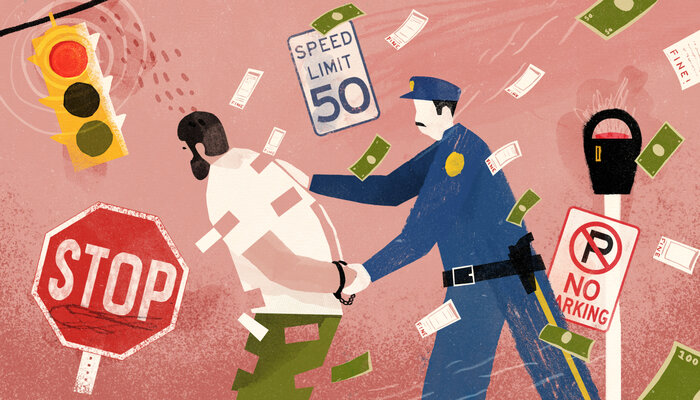
Police quotas don’t make communities safer — they prevent officers from focusing on larger public safety issues.
July 13, 2022
Imagine you are a police officer in one of the over 13,000 police departments across the United States. Instead of being tasked with using your skills and training to focus on preventing or responding to violent crime, you’re given a number. “Twenty and one,” or twenty tickets and one arrest per month. One speeding ticket during every hour of your 12-hour shift. Eighteen tickets a shift. Two to four search warrants a week. At least 100 tickets a month.
As some local police leadership says, “get your numbers up,” and you’ll be rewarded with overtime, pizza, barbeque, car wash coupons, gift cards, and trophies.
The Brennan Center’s new report details these types of incentives, specifically enforcement quotas where police leadership implicitly or explicitly direct line officers to hit a certain numerical goal per time period — stops, tickets, or arrests. Sometimes quotas are framed as an employee productivity measurement tool, and other times, law enforcement is pushed by local government leaders to use police enforcement to raise funds for a locality, often with little consideration for public safety.
In either event, tracking officer productivity through these numbers oversimplifies the complex reality of public safety and can incentivize officers to prioritize enforcement activities that can be completed quickly and easily, often faring well for their own employee evaluations, even where there is no real public safety need for them. This comes at the expense of devoting time to investigating more complex or violent crimes that significantly impact public safety.
Police enforcement quotas hurt everyone. They risk putting immense pressure on officers to meet required numbers, regardless of whether they observe crime or misconduct and no matter how impactful (or meaningless) those enforcement activities actually are for community safety. One study found that officers with arrest and citation quotas have a lower clearance rate for violent crimes. In the more extreme case, officers can resort to malfeasance to meet their quotas: fabricating a reason for a stop or arrest, assigning tickets to fictitious drivers, or even recording tickets for dead people. (Consider, for example, a recent lawsuit against the Chicago Police Department alleging a Chicago deputy chief “demanded certain numbers relating to police activity, regardless of the criminal or traffic activity justifying police intervention.”)
Police quotas significantly damage civilians’ trust in law enforcement, which is vital for police to perform their jobs effectively, especially given how important crime tips, eyewitness accounts, and court testimony are for investigations and prosecutions. Quotas have also been connected to racially biased enforcement. In one such case, New York Police Department officers alleged a commander “pressured them to enforce low-level violations against [B]lack and Hispanic people, while discouraging them from doing the same to white or Asian people.”
Many police officers have expressed distaste for these quotas, often concerned that being forced to prioritize certain enforcement actions over others removes their professional discretion to serve their communities’ unique needs. In fact, the National Police Research Platform found that “8 out of 10 police officers reported that their agency is ‘more interested in measuring the amount of activity by officers (e.g., number of tickets or arrests) than the quality of their work.’”
Some may argue that quotas encourage police to increase enforcement activities, which could hypothetically improve public safety. One recent study suggested high-visibility enforcement (i.e., uniformed officers and marked police vehicles) was connected to improved seatbelt use, decreased handheld phone use, and speed decreases in work zones. A 2011 study also concluded that an increase in tickets led to fewer motor vehicle accidents and related injuries. However, a 2015 article found the opposite conclusion: as the number of traffic tickets declined sharply nationwide starting in the early 2000s, so did traffic injuries and fatalities.
While at least 26 states (including Iowa, Mississippi, Montana, Nevada, and Virginia) and Washington, DC, have laws prohibiting quotas, there has been limited success in using legal avenues to rein in their widespread use. It’s difficult to get a sufficiently inclusive definition of what a quota really is, and it’s hard for police officers to report the use of quotas due to the “blue wall of silence” and the legitimate fear of retaliation. Officers who do report misconduct may have police unions that funnel issues into closed-door arbitration instead of public lawsuits, hiding wrongdoing from the public and thereby hindering potential reform.
Legislators must enact comprehensive legislation to outlaw enforcement quotas completely. As law school professor Shaun Ossei-Owusu argues, anti-quota statutes need to encompass a wider definition to include both formal and informal quotas, prohibit all enforcement activities (warnings, stops, citations, or arrests) as criteria for employment actions, protect whistleblowers, and create consequences for police leadership that implement or enforce quotas.
There are other ways to enforce traffic laws, keep people safe, and evaluate police officers as employees without forcing officers to meet arbitrary number requirements. Alternative metrics could include community members’ satisfaction with their engagement with officers, the rate of police encounters safely de-escalated, and the number of successful diversion efforts.
Anything less risks turning police into revenue generators at the expense of addressing real public safety issues.